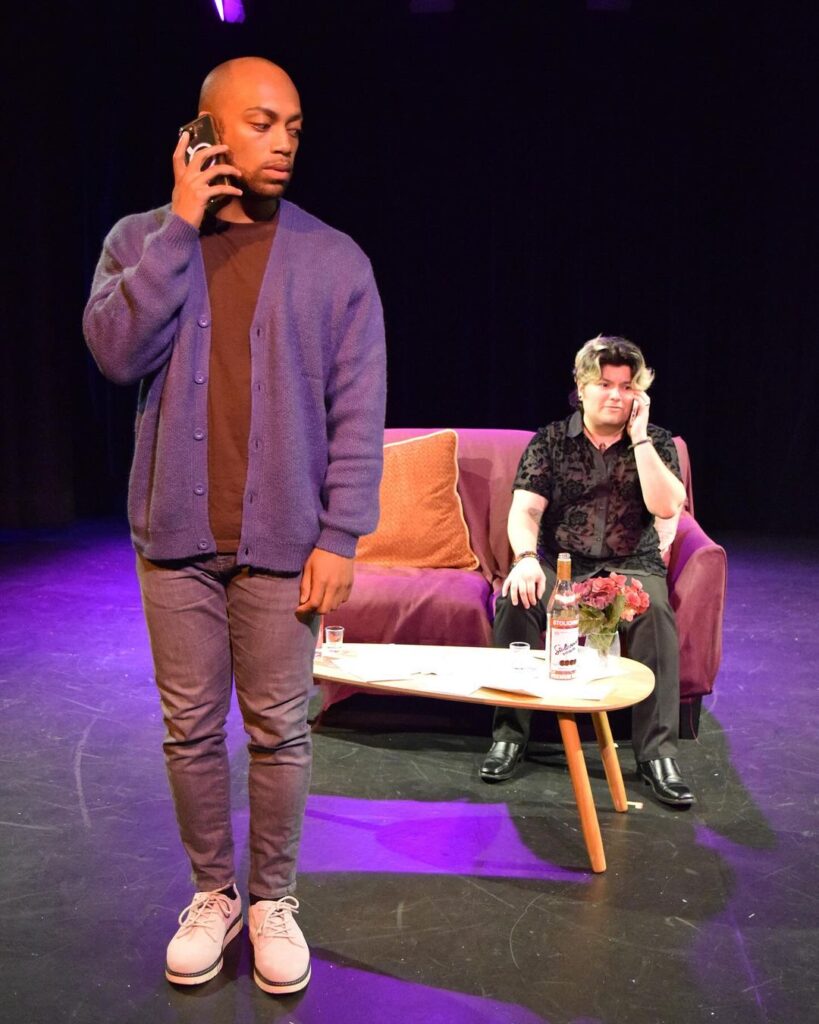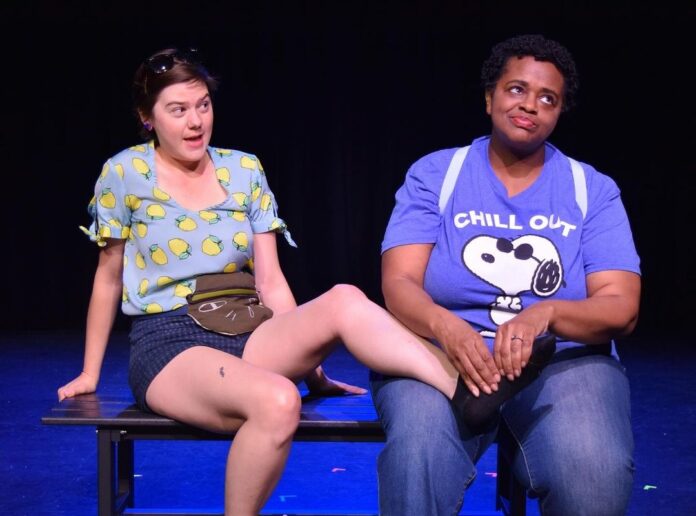One thing I hated about coming out as bi as a teen was how straight and gay people would both tell me that bisexuality didn’t exist. Looking back, I’m not sure if they were just ignorant or intentionally gaslighting, but it sure didn’t help my fragile young mind as it tried to figure out just what was going on with me. One can’t really start to understand who they are when everyone’s telling them to their face that they don’t exist.
Such is the thinking behind Left Coast Theatre Co.’s Hear Our Voices: Stories of Underrepresented Queer Identities (through May 18 at the Phoenix Theatre, SF). At least, that’s the intention: an hour of short plays that highlight the lesser-known descriptors of the LGBTQIA+ spectrum. Like the Kinsey Scale, the collection of shorts aims to take queerness out of the binary. A great idea, but the result suggests that not everyone understood the assignment.
The evening certainly starts off strong with Kayla Hambeck’s solo piece “Ace of Dates.” As the title suggests, it centers on the asexual Kate (Jeffrie Givens) as she prepares to go out on a date. At least, she’s supposed to be preparing; in reality, she’s debating with herself whether or not to even go. Hambeck’s script is as hilarious as it is touching, with Kate’s need for emotional human companionship clashing with her outright disgust for the mechanics of sexual intercourse. (“It is literally friction,” she protests. “I just don’t get it!”)
The most telling and pointed moment of this extended soliloquy is when she realizes that she wants someone to simply hold hands with and binge-watch shows—not a bad situation when you think about it. Buoyed by delicate direction from Kieran Baccia and a lovely performance by Givens, “Ace of Dates” is almost too good, with the four succeeding shorts trying to reach the high bar it sets.
Next up is Diego Rios Brady’s “RSVP,” in which an engaged queer couple (Omar Stewart and Kaz Valtchev) trade laughs and shots of vodka as they count the family declinations to the couple’s upcoming wedding. Like the preceding piece, it mines both laughs and pathos from the relative simplicity of the topic. In a way, our couple were so expecting “no”s from “old-fashioned” family members that one thinks this may just be an excuse to empty bottles of Stoli and Absolut Rasperri.
Yet, they’re caught off-guard when receive letters from beloved family members—the ones whom they thought were open-minded. The piece is well-written, well-performed, and well-directed (by Tessa Corrie), but there’s nothing about it that really speaks to overlooked queerness the way the preceding play did with asexuality. It’s just a funny and emotional queer play.
More on-topic is Deidre Bagdasarian’s “Pivot,” in which a lesbian couple (Jeffres Givens and Puja Tolton) take a ferry to Seattle, where one is relocating for work. We come to realize that they’re two members of a throuple with a cis guy, with one of the women being legally married to him and mother to their kids. Also directed by Corrie, this piece explores the inevitable complications of polyamory when it goes beyond sex into full-fledged relationships. The premise is good, but Bagdasarian’s dialogue tends to veer into over-exposition, with the characters at times seeming to be giving a joint TED Talk titled “Throuples: Ain’t They Wacky?”. It works best when the more natural dialogue paints these people as, well, people, not avatars for public discourse.

Louis DeVaughn Nelson’s “Daidy, or Daddy with an ‘I’” is another solo piece. Directed by Michael Conner, the play centers around a gay man (Stewart, whose character may or may not be Black) recounting the complicated relationship with his late father, who probably always knew the young man was gay. Nice, but well-trod territory for queer stories.
The evening ends with its longest piece, Cedar Schwab’s “The Routine,” in which a Jewish trans man (Kaz Valtchev) uses open-mic night to perform a stand-up routine about his complicated relationship with his misgendering mother (AJ Davenport). When the two meet up for lunch a somewhat nosy hostess (Puja Tolton) begins to go a bit too far with her allyship. Well-acted and -directed, but I’ve attended too many stand-up shows to believe this story would go over with a crowd, especially at the length at which it’s told.
The talent on display is apparent throughout the evening, but the show’s title—particularly its subtitle—would be more fitting if the entire collection had stuck to exploring the wider aspects of queer identity. “Ace of Dates” and “Pivot” pull it off best with their respective looks at asexuality and polyamory, but the rest of the scripts veered so far away from the goal that it began to feel like just another evening of “gay plays.” Granted, the quality of some of them justified it, but one or two more scripts exploring the lesser-known queer identifiers would’ve gone a long way.
The opening night crowd at The Phoenix wasn’t full, but the 414 Mason is still an old building, so the CO² began to accumulate fast. No sooner had I sat down when my Aranet4 read about 832ppm. By the end of the show, it was at 1298ppm (by no means the worst I’ve ever seen).
Hear Our Voices starts with an absolute winner, followed by a mixed bag of pieces trying their best to measure up. No one would fault any audience member for seeing themselves in any–or all—of these characters; one just longs for a bit more to see.
HEAR OUR VOICES runs through May 18 at the Phoenix Theatre, SF. Tickets and further info here.








